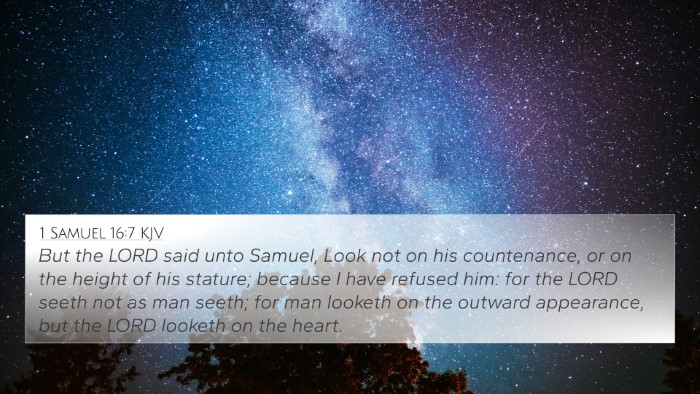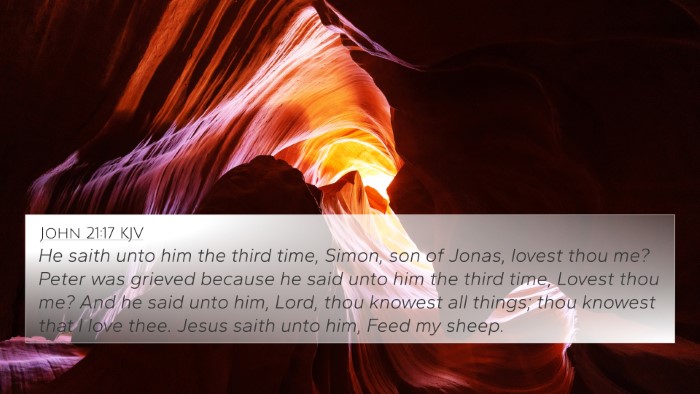Understanding 2 Samuel 7:20
In 2 Samuel 7:20, King David speaks to the Lord in prayer, reflecting on the greatness of God and his unworthiness. This verse is pivotal as it illustrates David's humility and acknowledges God's sovereignty and plan for Israel.
Text of 2 Samuel 7:20
"And what can David say more unto thee? for thou, Lord God, knowest thy servant." (2 Samuel 7:20 KJV)
Meaning and Interpretation
The following insights summarize the meaning of this verse, integrating perspectives from various public domain commentaries:
-
Matthew Henry's Commentary:
Henry highlights the humility of David in recognizing his limitations and God's omniscience. David acknowledges that there is little more to say beyond the immutable truth of God’s knowledge of his heart and service.
-
Albert Barnes' Notes:
Barnes emphasizes the gravity of the relationship between God and David, suggesting that since God is fully aware of David’s character and actions, his words are almost unnecessary. This underlines the theme of divine knowledge and human response.
-
Adam Clarke's Commentary:
Clarke notes that David's acknowledgment of God's knowledge signifies a deep spiritual understanding. He recognizes God's plans and purposes are beyond his comprehension, highlighting the themes of revelation and divine guidance in David's life.
Thematic Connections
This verse connects with several themes found throughout the Bible, including God's omniscience, the nature of prayer, and the humility required in approaching the Divine. Below are some important cross-references that enhance the understanding of 2 Samuel 7:20:
- 1 Chronicles 28:9: A parallel instance where David encourages his son Solomon to seek the Lord passionately, emphasizing the necessity of knowing God's ways.
- Psalms 139:1-4: David reflects on God's omniscience, acknowledging that God knows his thoughts and actions before they even manifest.
- Isaiah 66:2: God values humility and contrition over ritualistic offerings, much like David’s humble approach in this verse.
- James 4:10: “Humble yourselves in the sight of the Lord, and He shall lift you up,” echoing David's submissiveness to God's will.
- John 10:14: Jesus speaks of knowing His sheep, correlating with the intimate knowledge God has of David.
- Romans 8:27: The Spirit intercedes according to God's will, again highlighting God's deep understanding of human hearts.
- Revelation 3:20: Jesus offers communion to those who hear His voice, reflecting God’s desire for relationship as seen in David's prayer.
Conclusion
2 Samuel 7:20 serves as a profound reminder of the relational aspect of faith—humility, recognition of God's greatness, and an understanding that He knows our hearts. David's prayer is not merely a request but an expression of worship and submission.
Exploring Further through Cross-Referencing
For those looking to deepen their understanding of biblical themes and connections, using tools for Bible cross-referencing can illuminate many interconnections across the Scriptures:
- Utilize a Bible concordance to find related verses and themes.
- The Bible cross-reference guide can help navigate through cross-linked verses across different books.
- Engage in cross-reference Bible study methods to explore connections between scriptures more systematically.
- Leverage Bible reference resources to trace themes throughout the Bible effectively.
- Explore Bible chain references to see how various teachings interplay both within the Old and New Testaments.
How to Find Cross-References in the Bible
When seeking to identify connections between specific verses, consider the following approaches:
- Consult a detailed cross-reference index in your Bible or study tools.
- A comparative study of the Gospels can reveal significant parallels and themes between teachings.
- Explore the prophecies in the Old Testament and their fulfillment in the New Testament for deeper insights.
Understanding 2 Samuel 7:20, coupled with these cross-references, enriches our comprehension of the Scriptures and provides a guide for deepening one's faith and relationship with God.









